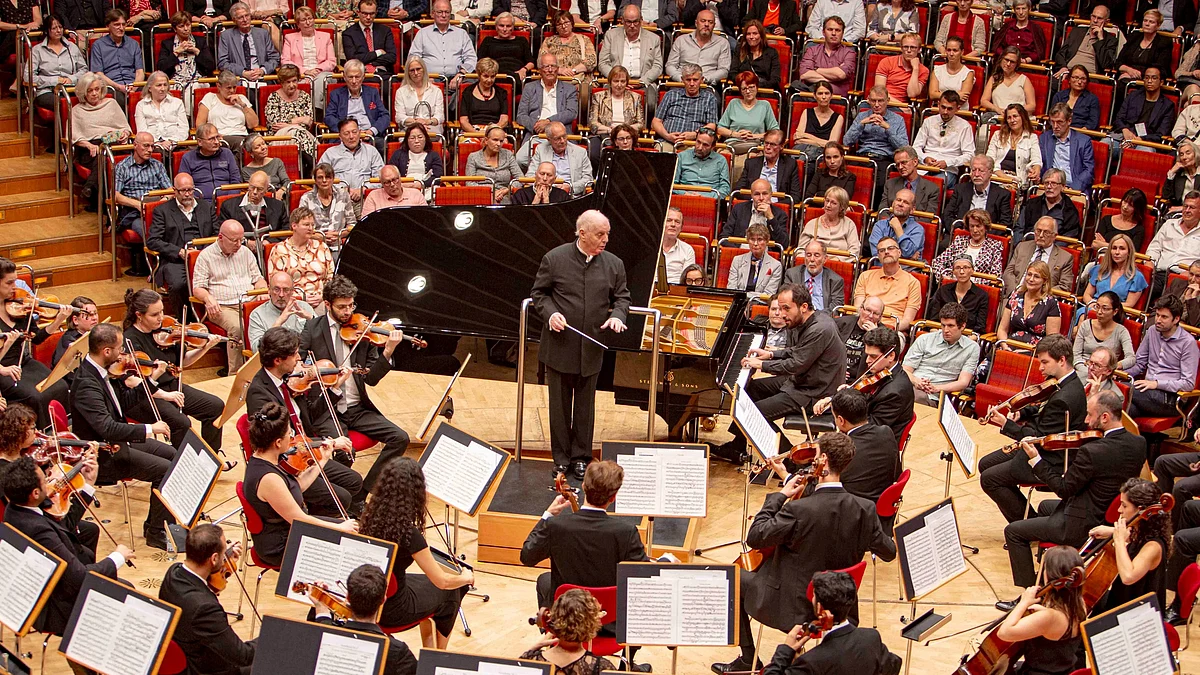Palestinian activist Ali Abu Awwad, Jewish pianist Daniel Barenboim for Indira Gandhi peace prizes
Maestro Barenboim, a friend of Palestinian scholar Edward Said, uses music to foster harmony in West Asia, while Awwad founded the Israeli–Palestinian initiative Roots and the Taghyeer movement

The Indira Gandhi Prize for Peace, Disarmament and Development for 2023 was awarded to Argentina-born pianist and conductor Daniel Barenboim and Palestinian activist Ali Abu Awwad for their efforts to bring together the youth of West Asia—of particular significance at this historical moment given the current status of the Israel–Palestine conflict.
The duo were selected by an international jury, chaired by former chief justice of India T.S. Thakur, for having achieved public participation and engagement across the conflict-ridden nations and territories of West Asia, with music and dialogue as their respective languages of activism.
Ali Abu Awwad, who was born a political refugee himself in 1972, has a family background of resistance in Palestine. He experienced the power of Gandhian non-violent activism himself while incarcerated at the same time as his mother (a PLO leader who worked with Yasser Arafat) during the First Intifada, when they were held apart and denied all interaction for 3 years. A 17-day hunger strike in tandem resulted in the permission to visit with each other finally being granted. (They would be released only in 1993, once the Oslo Accord was signed.)
Later, in 2014, Awwad would co-found the Palestinian–Israeli initiative Roots, to promote transformation in the region, emphasising non-violence and understanding across the two communities. Eventually, his efforts would inspire the Taghyeer movement of peaceful resistance to Israeli occupation of the West Bank in 2016.
To this day, he speaks on behalf of both Israeli and Palestinian people of a 'painful hope':
Non-violence is the art of practising your humanity. It is the art of being a human being. Peace is a place where we can live by accepting our differences and respecting each other’s rights.Ali Abu Awwad, Palestinian peace activist
For Maestro Daniel Barenboim, founder of the West–Eastern Divan Orchestra and the Barenboim–Said Akademie in Berlin — alongside his famous scholarly friend, the late Dr Edward Said — bringing together the youth of Israel and Palestine through music was a way to create mutual understanding, and from there, hopefully, harmony.
His ensembles also feature musicians from other Arabian as well as North African countries. The pianist turned 81 last month.
To make music, you have to listen. You have to listen [to] what the other one is doing, but you also have to listen [to] what you are doing and how it affects the other — this is the best school of human relations.Daniel Barenboim, Argentina-born Israeli pianist and conductor
Despite having one of the rare persons to have simultaneously held Israeli and Palestinian citizenships, Barenboim—Jewish himself—has been an outspoken critic of Israel's occupation policies for a long time.
He was also one of the foremost in the world of culture and entertainment to call Israel's retaliation against Palestine disproportionate and contrary to human rights, even as he "fiercely" condemned the Hamas attack of 7 October. He was categorical in his social media post on X (formerly Twitter) that the "Israeli siege on Gaza constitutes a policy of collective punishment".
In the post, he also recalled his friend Edward Said and their agreement that "the only path to peace between Israel and Palestine is a path based on humanism, justice, equality and an end to the occupation" and not military action.
Again, on 15 October in a column in the Guardian, even as Israel prepared for its ground incursion into Gaza, he would write: 'we must urge Israel to uphold international law as it prepares to invade Gaza'.
Noting that almost all the musicians in the West-Eastern Divan Orchestra and almost all the students at the Akademie were personally affected by the conflict due to their own ties to both nations, some of them having homes and families in the region, he nonetheless added:
Our message of peace must be louder than ever. The greatest danger is that all of the people who so ardently desire peace will be drowned out by extremists and violence. But any analysis, any moral equation we might draw up, must have at its core this basic understanding: there are people on both sides. Humanity is universal, and the recognition of this truth is the only way. The suffering of innocent people on either side is absolutely unbearable.Daniel Barenboim
With an empathy and evenhandedness rare in these times, he wrote of the history of the conflict between Israel and Palestine: 'It is a deeply human conflict between two peoples who have known suffering and persecution.'
He acknowledges that the historical 'persecution of the Jewish people over 20 centuries culminated in the Nazi ideology that murdered 6 million Jews'; but goes on to bring balance to the picture as he continues to point out the problematic perspective in the Zionist response too:
The Jewish people cherished a dream: a land of their own, a homeland for all Jews. But from this dream followed a deeply problematic—because it was fundamentally false—assumption: a land without a people for a people without a land. In reality, the Jewish population of Palestine was only 8% by the end of the first world war. Therefore, 92% of the population was not Jewish, but Palestinian—a population grown over centuries. The country could hardly be called a “land without a people”, and the Palestinian population saw no reason to give up their land. The conflict was thus inevitable...
The full text of the announcement of this year's Indira Gandhi Peace Prize from the Indira Gandhi Memorial Trust can be read below:
Follow us on: Facebook, Twitter, Google News, Instagram
Join our official telegram channel (@nationalherald) and stay updated with the latest headlines
